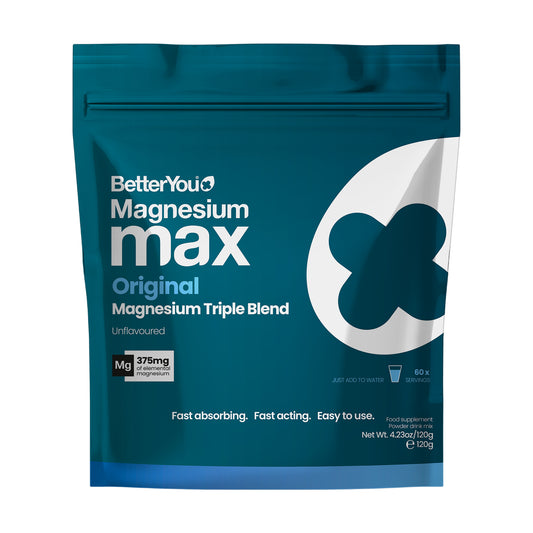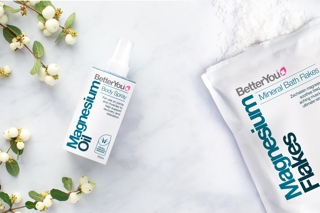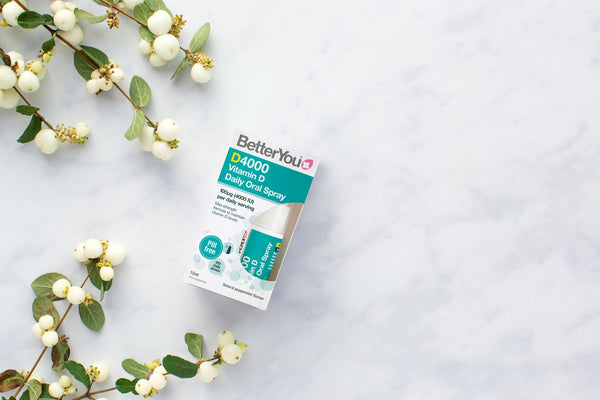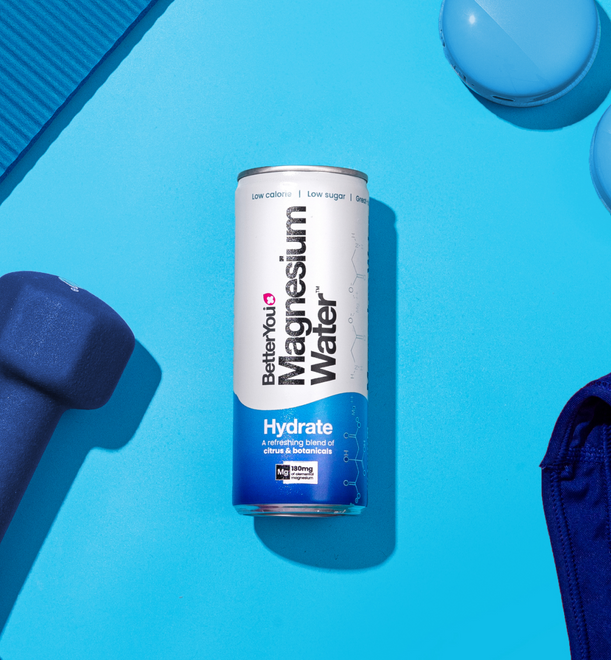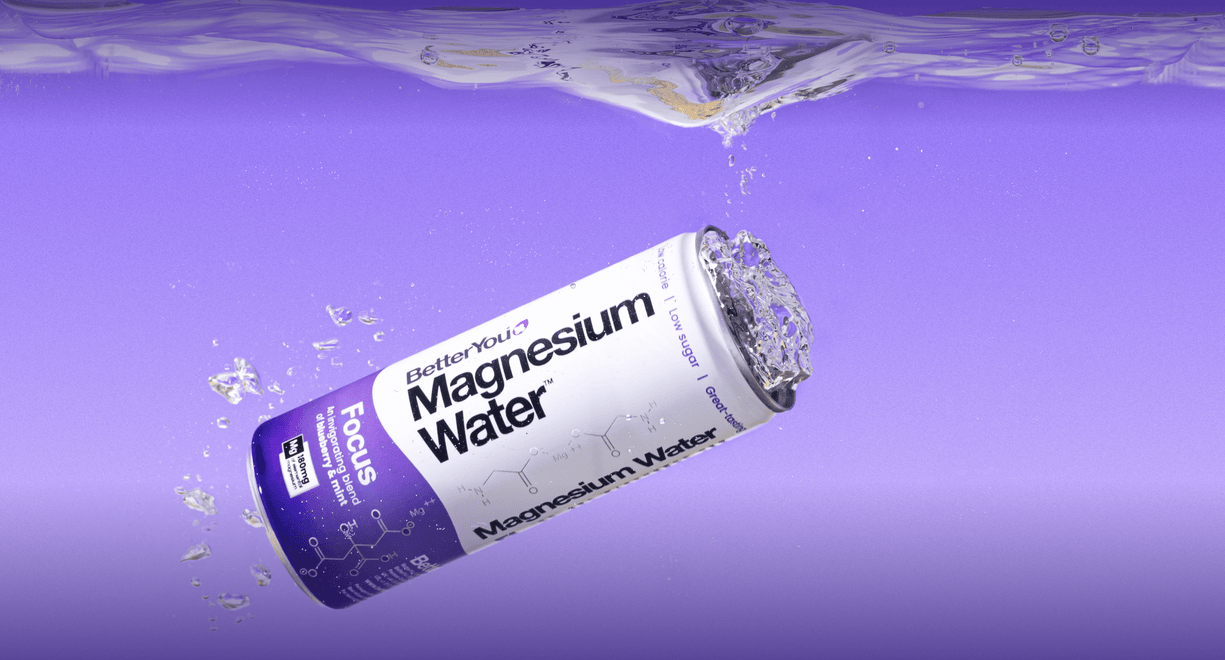Supplementing magnesium for menopause could help to soothe your symptoms. During the menopause, the body goes through many changes due to fluctuating hormones, which could lead to poor sleep and aching muscles. Our expert guide shows you how obtaining magnesium for menopause could help in providing relief from the side effects.
Table of Contents:
- Can Magnesium Help Soothe Symptoms?
- What Type of Magnesium is Best for Menopause?
- How Much Magnesium for Menopause?
- Magnesium Deficiency in Menopause
- Support Your Menopause with BetterYou Pill-Free Supplements
Can Magnesium Help Soothe Symptoms?
You may be able to soothe some of the common signs of menopause with menopause supplements. One nutrient in particular is magnesium, which may soothe your restless nights and tense muscles. This is thanks to the many benefits of magnesium, which include its role with sleep and muscle relaxation.
Although the mineral is very important to your health throughout your life, it may be more vital than ever during this time. Women and those experiencing the menopause may be more susceptible to low nutrient levels, and may consider magnesium supplements to support their health during the menopause.
Improving Sleep
A common menopause symptom is difficulty sleeping. This can affect anyone experiencing this transition. Whether hot flushes keep you up at night, or you simply can’t get comfortable. No matter why you’re tossing and turning at night, it can leave you feeling tired and irritable during the day.
Magnesium helps you sleep by regulating your melatonin levels. Melatonin is a natural hormone produced by the pineal gland which impacts your sleep cycle. It effectively tells your body when to sleep or awaken. Thanks to magnesium’s relationship with melatonin, this sleep supplement can help you drift off at night.
Muscle Relaxation
Not only that, but magnesium supports your body as a natural muscle relaxant. This can help you feel more at peace as you wind down for bedtime. Taking magnesium for menopause to naturally aid sleep may help you feel more well rested.
What Type of Magnesium is Best for Menopause?
During menopause, magnesium can be available in many different forms. One form is magnesium chloride which is what BetterYou uses in our supplements. We use a pure form known as Zechstein magnesium, which is sourced from the sea with the same name. Buried under rocks and protected from modern contaminants, this form of magnesium for menopause can help you relax and support your sleep.
Magnesium Bath Flakes
The perfect way to wind down after a long day, magnesium bath flakes offer a chance to supplement magnesium for menopause without the hassle of taking a tablet.
BetterYou’s bath flakes are made with magnesium chloride, which are different to Epsom salts. These are made from magnesium sulphate, which is one of the most common forms of this type of mineral. While both may help you increase your levels of magnesium for menopause, BetterYou’s flakes contain a pure form. This form is more easily absorbed and utilised by the body when compared with Epsom salts.
Simply shake the bath flakes into your bath water. The magnesium ions and chloride ions which make up the flakes are weakly bonded together, and break apart easily and dissolve in the water.
Magnesium Cream
Supplementing magnesium for menopause is easier than ever with magnesium creams.
Offering a blend of Zechstein and shea butter, these help to relax muscles and improve the skin’s elasticity and softness.
Use them before or after exercise to support bone and muscle health, or as part of your bedtime routine.
Magnesium Body Sprays
Another form of magnesium for menopause is an oil or spray. Magnesium sprays are applied to the skin, in a similar way to a cream or lotion.
Magnesium sprays are quick and effective in helping your nutrient levels. Designed to be taken on the move, they are an easy pill-free solution to supplementation.
Pill-free supplements like these can help to provide a simple solution to your magnesium for menopause needs.
How Much Magnesium for Menopause?
Magnesium is found in food sources such as spinach, nuts and beans. However, many may not be able to intake enough magnesium for menopause from their diet alone.
According to the NHS, women need approximately 270 mg of magnesium per day, from the ages 19 to 64.
Since the menopause usually occurs between the ages of 45 to 55, it’s essential to ensure optimal levels during this time. When supplementing magnesium for menopause orally, taking large doses could have a laxative effect. BetterYou’s products don’t have the same effect because they don't pass through the digestive system.
Magnesium Deficiency in Menopause
Many may experience low nutrient levels during the menopause. Magnesium deficiency can be common during this time, and can cause detrimental effects which affect your health. Steering clear of these is especially important during the menopause, because of the bodily changes already occurring due to hormonal fluctuations. The common signs of low magnesium include:
- Poor sleep
- Fatigue
- Heart palpitations
Supplementing magnesium for menopause can help you avoid these effects, by increasing your levels. You should seek medical advice from your GP or other health professional if you think you have the signs of a vitamin or mineral deficiency. They may arrange a blood test to identify whether you have low mineral levels or a deficiency. Always consult medical advice before taking supplements.
Support Your Menopause with BetterYou Pill-Free Supplements
BetterYou pioneered oral spray supplements as a convenient and effective method of nutritional supplementation. You can spray into your mouth, and continue about your day with our hassle-free formula of women’s health supplements. Designed to encourage an optimal intake of nutrients alongside your diet, support your body with magnesium for menopause without the need to swallow a tablet or pill!
Supplementing with BetterYou
At BetterYou, we pioneered oral spray and topical magnesium supplementation. From energy supplements for that needed boost, to children’s vitamins to support your little ones growth.


